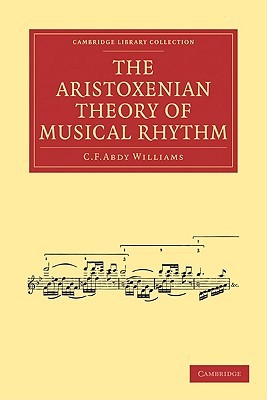
- We will send in 10–14 business days.
- Author: C F Abdy Williams
- Publisher: Cambridge University Press
- ISBN-10: 1108004873
- ISBN-13: 9781108004879
- Format: 15.2 x 22.9 x 1.2 cm, minkšti viršeliai
- Language: English
- SAVE -10% with code: EXTRA
Reviews
Description
'Keeping time', along with artistic accentuation and intelligent phrasing, is essential to successful musical performance. Rhythm alone had rarely been the subject of specialised study until the late nineteenth century, when several books on this topic by Rudolf Westphal were published in Leipzig. Westphal's work inspired Charles Francis Abdy Williams's 1911 book which is reissued here. Williams re-examines the classical and romantic repertoire from Handel to Tchaikovsky in the light of ancient Greek musical theory, focusing particularly on the earliest writings by Artistoxenus of Tarentum (fourth century BCE). In Williams's view, the rhythmic forms used by the Greeks are universally intelligible, and appear in all ages and cultures, unlike melodies or scales, which vary hugely. He provides insights into the microstructure of works including Bach's oratorios, Beethoven's sonatas and Schubert's songs, which will continue to intrigue musicians, classicists and mathematicians today.
EXTRA 10 % discount with code: EXTRA
The promotion ends in 22d.10:24:30
The discount code is valid when purchasing from 10 €. Discounts do not stack.
- Author: C F Abdy Williams
- Publisher: Cambridge University Press
- ISBN-10: 1108004873
- ISBN-13: 9781108004879
- Format: 15.2 x 22.9 x 1.2 cm, minkšti viršeliai
- Language: English English
'Keeping time', along with artistic accentuation and intelligent phrasing, is essential to successful musical performance. Rhythm alone had rarely been the subject of specialised study until the late nineteenth century, when several books on this topic by Rudolf Westphal were published in Leipzig. Westphal's work inspired Charles Francis Abdy Williams's 1911 book which is reissued here. Williams re-examines the classical and romantic repertoire from Handel to Tchaikovsky in the light of ancient Greek musical theory, focusing particularly on the earliest writings by Artistoxenus of Tarentum (fourth century BCE). In Williams's view, the rhythmic forms used by the Greeks are universally intelligible, and appear in all ages and cultures, unlike melodies or scales, which vary hugely. He provides insights into the microstructure of works including Bach's oratorios, Beethoven's sonatas and Schubert's songs, which will continue to intrigue musicians, classicists and mathematicians today.


Reviews